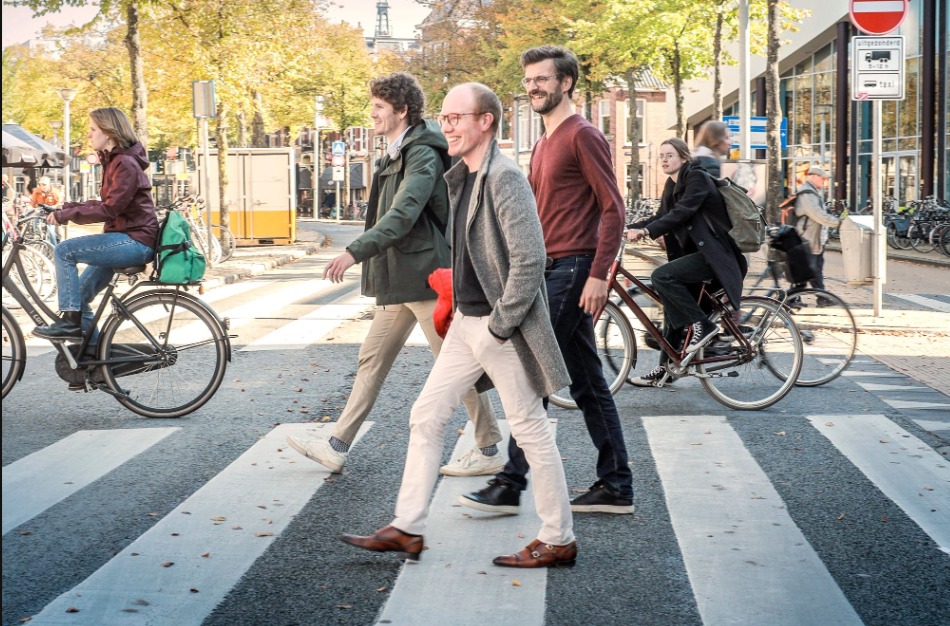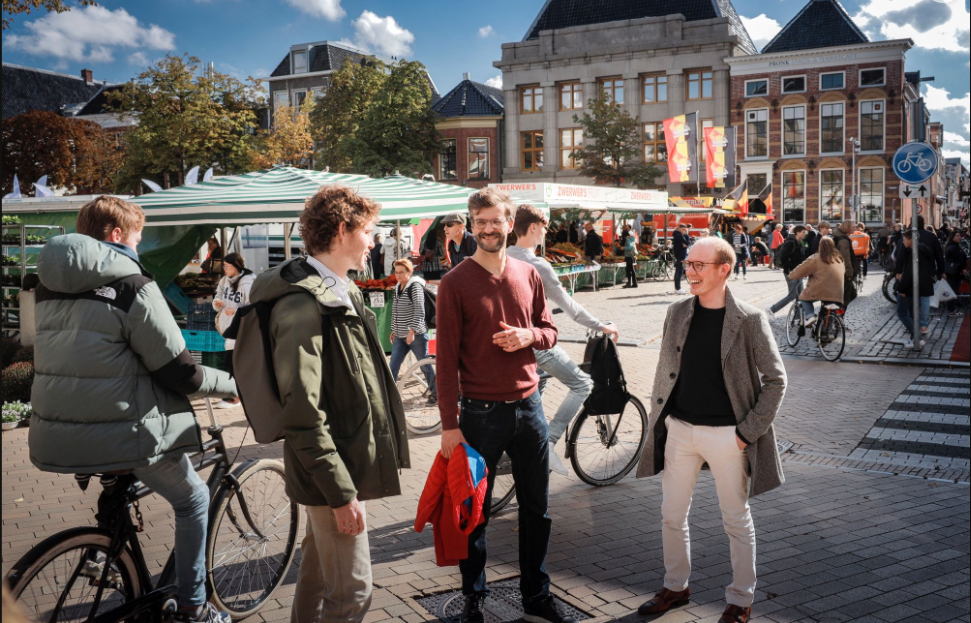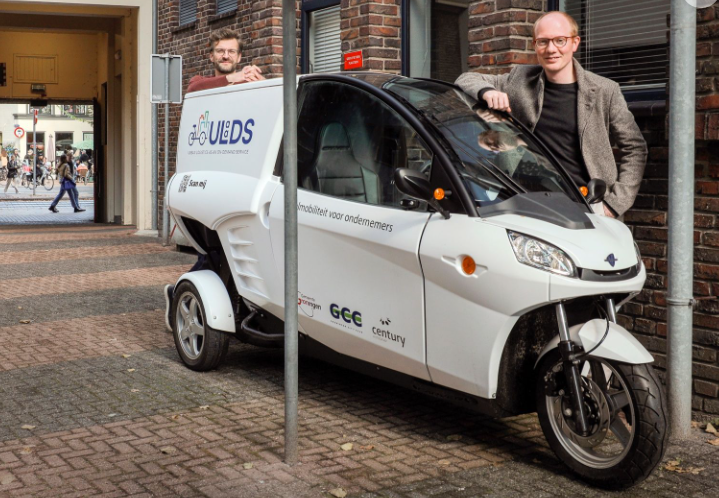'We’re often amazed about the lack of attention paid to logistics in urban planning.'
How do you render urban logistics sustainable? That is a question which fascinates dr. Ir. Paul Buijs and dr. Ward Rauws. Buijs is a business manager with a passion for efficient organisation. Rauws is an urban planner exploring the impact of policy on a city. They have found each other in the interdisciplinary research group ‘ Logistics in the Sustainable Urban Landscape’ of the Rudolf Agricola School. In this interview, they discuss the challenges and opportunities of urban logistics. They explain how interdisciplinarity can function as an eye-opener, along with the importance of collaboration between academics and policy-makers.

Interview: Marco in 't Veldt
Ward Rauws: Logistics equals transport and concerns goods and services, i.e. the economic side of the city. All goods required within the city need to be transported there, one way or another. I’m often amazed about the lack of attention paid to logistics, even though this is vital for the operation of the city. And any attention paid to it, is often negative. In the news, we tend to read about how much of a hindrance parcel delivery vans form, even though that is only a very small component of the logistics process. The lion’s share of logistics concerns stocking of shops and all the facility services used in offices, such as coffee, toilet paper and cleaning work. And let’s not forget construction traffic.
Paul Buijs: ‘There are so many logistic movements, and we cannot simply say ‘let’s do away with them.’ After all, things need to be brought into the city. I look at it from the business perspective; therefore who will organise those flows and logistic movements? And how can we render them more efficient?
Take the stocking of the university offices for example. Any number of suppliers trundle in and out delivering supplies for the printer, the coffee corner, etc. All these companies make every possible effort to deploy their means of transport as efficiently as possible. If society requires them to deploy those vehicles as sustainably as possible, the companies are ready to take action. Most companies are very willing to innovate. The electrically driven supply chain has already increased considerably, for example. No more smelly diesel therefore. However, the point is that there are issues which transcend individual companies. The university can sometimes arrange for the combined delivery of goods, for example. Individual suppliers won’t think that way. The printer supplier alone is not going to think ‘Maybe we can combine our delivery with the delivery of coffee.’
At the same time, the city council is trying to get a grip on the situation. They have ordained, for example, that any logistics movements in the centre must be limited to a period from 5 o’clock in the morning to 12 noon at the latest: after that, the city streets belong to the shoppers. We reached a point at which I became aware that while we had made considerable progress towards sustainable and innovative logistics by the companies, maybe we should consider it in terms of the public space, regulations and spatial impact. That’s when I realised: ‘I know someone who’s looking at the same problem and at comparable processes, from that side of the table: Ward!’ Because Ward is an urban planner.
Ward: ‘Paul’s invitation got me thinking: ‘What’s the difference between personal mobility and the mobility of logistics flows? The government is very accustomed to involving itself in the mobility of people by now, when it comes to ‘Who offers such services?’ or ‘Where are the bus stops?’, for example. Yet logistics is mainly considered to be a market task. This means that there has been very little steering and very little policy regarding the impact of logistics on the public space. It took Paul’s invitation to make me realise that!
The logistics sector is characterised by many customers and services who all operate from their own little islands. Indeed, some of them do so extremely smartly, while others tend to muddle along. But if we really want to reduce all our traffic, we need to zoom out and determine ‘How are all these things interrelated?’ and ‘What role can government bodies and companies play together?’.

So how did you start off together?
Ward: We first needed to learn to speak and understand each other’s languages. If Paul says ‘B2B’ for example, I need to know what he means, and I had no clue. It turns out to mean Business to Business.
One of the subjects which we have discussed at length is that of parcel lockers, whereby you no longer deliver parcels to individual residential addresses but rather to a neighbourhood pickup point. That certainly reduces many delivery vans driving around. As an urban planner, I immediately considered the social implications. Could we not link all kinds of neighbourhood processes to that? How about turning them into social meeting places where you could also borrow tools and enjoy a cup of coffee?
But then I learned to consider Paul’s point of view and realised: yes but that social meeting place still needs to be stocked and must therefore still be somewhere where the vans can access. And we might well claim that it’s sustainable with less emissions, but what conditions need to be met to actually achieve that?
Paul soon showed me that even if a small number of consumers uses their car to collect a parcel from such a pickup point, the emission savings versus home deliveries are already negligible. And vice versa: I’m aware that you cannot just install such lockers anywhere, you need to have a good understanding of how people use their neighbourhood and the routes they take in doing so. And so, case studies help us to understand each other’s thought processes.
Paul: I introduce all kinds of organisational and business issues, and Ward concentrates much more on what local residents or policy-makers can or cannot do. When discussing this with the municipality of Groningen for example, I discovered that electrically powered vans are much more expensive than diesel versions, for businesses to purchase. Our question: what would happen if we did allow the use of an electrically powered van after 12 noon? We would be helping businesses to optimally deploy the van, making it less expensive to use. However, that conflicts with the interests of the municipality, who want to keep all freight traffic out of the centre after 12 noon.
Such conflicts of interest result in mega interesting discussions between Ward and myself. Together we might conclude: from the business perspective, we will soon reach a point at which electric vans are always the best choice. If you lift the restrictions on electric vans, the city will sooner or later be full of electric delivery vans after 12 noon, i.e. all day long, while the delivery windows were designed to give shoppers a quiet and enjoyable experience.

So how do you collaborate?
Ward: Of course policy-makers don’t turn up on our doorstep with a combination of individual scientific disciplines in mind. They simply approach us according to the facts of the project. What you think of this, as scientists? And so we are forced to bundle our knowledge, over the disciplines.
Your approach then needs to take in completely different time perspectives for example: logistically speaking, it's a case of ‘What needs to be delivered at this time?’. From an urban planning point of view, you’re faced with very long-term issues on the other hand, such as redesign of the Grote Markt in Groningen, for example. You then have the opportunity to physically alter the preconditions possibly ‘once in a number of decades’.
Of all the RUG scientists I know, I think that Paul is the most grounded. He can literally be found sitting next to a planner or a truck driver, or in a sounding board group with entrepreneurs. When formulating policy, there is often a serious lack of attention for that sort of experience, resulting in new spatial policy not really conforming to how the city is actually used.
At the same time, policy-makers have an unenviable role. The transition is progressing at breakneck speed, is considerably unpredictable, and they are also at close quarters to the somewhat volatile political world. We scientists enjoy somewhat more distance – which is a luxury – but that can help us to contribute. On his retirement a while ago, a Groningen policy-maker informed me: ‘You put words to the type of enquiring and incremental form of policy-making which I was already doing, and in doing so you legitimised it; I wasn’t crazy after all, because it had a theoretical foundation.’
Participate in the Logistics in the Sustainable Urban Landscape research groupWhat special knowledge is already included in your research group and what would you like to add to it? Until now, the Logistics in the Sustainable Urban Landscape group mainly contains people from our two professions. Urban planners, geographers, business managers, econometricians. What we really need are historians for the time perspective of the interaction between urban development and logistics. Environmental psychology would be interesting in order to study how residents behave in the use of logistic services. And economists. Can we more effectively quantify things such as the share of small businesses?
|
-
Rauws, Plazier, Buijs, Neef (2023) Duurzame stadslogistiek binnen bereik? In: Rooilijn
-
Future-proof your SULP: an adaptive approach to guide urban logistics towards sustainability
| Last modified: | 08 October 2024 1.20 p.m. |
More news
-
10 June 2024
Swarming around a skyscraper
Every two weeks, UG Makers puts the spotlight on a researcher who has created something tangible, ranging from homemade measuring equipment for academic research to small or larger products that can change our daily lives. That is how UG...
-
21 May 2024
Results of 2024 University elections
The votes have been counted and the results of the University elections are in!

